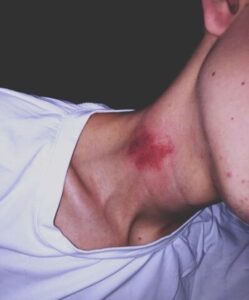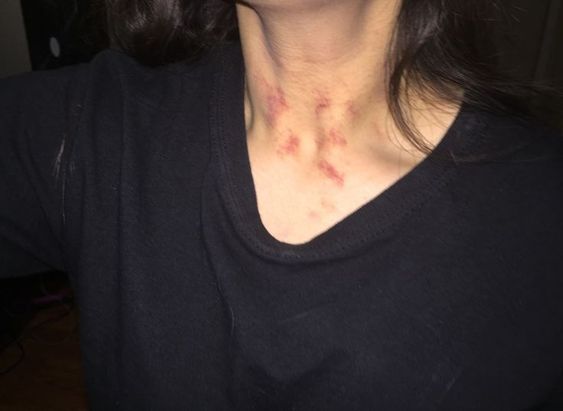Do Hickeys Cause Cancer: Do hickeys cause tumors
No, hickeys do not cause cancer. Hickeys are essentially bruises that occur when someone sucks or kisses the skin, causing small blood vessels near the surface to break and leak blood. While hickeys can be unsightly and may cause some discomfort or mild pain, they are not linked to the development of cancer. Read about Is Cancer a Fungus
Cancer is a complex disease caused by genetic mutations and various environmental factors, such as smoking, exposure to harmful chemicals, and certain infections. Hickeys, on the other hand, are a temporary and relatively harmless skin condition that does not have any known connection to cancer.

Hickeys and Cancer Risk
Hickeys are essentially bruises that form when someone sucks or kisses the skin hard enough to break small blood vessels near the surface. These broken vessels cause blood to leak into the surrounding tissues, resulting in a visible mark. Despite their sometimes unsightly appearance, hickeys are generally harmless and not linked to serious health issues like cancer.
The Science Behind Hickeys
To understand why hickeys do not cause cancer, it’s important to delve into the science of how they form. When someone applies suction or pressure to the skin, it causes the capillaries (small blood vessels) under the skin to burst. This leads to the pooling of blood in the area, which appears as a reddish or purplish mark. Medically, this can be referred to as ecchymosis, erythema, hematoma, purpura, or petechiae, depending on the nature and extent of the bruising.
Addressing the Rumors: Hickeys and Cancer
Hickeys and cancer risk have been a topic of numerous rumors and misconceptions. Some believe that the suction involved in creating a hickey can somehow lead to cancerous growths. However, there is no scientific evidence to support this claim. Medical experts and researchers have extensively studied cancer causes, risk factors, and prevention strategies, and there is no credible research linking hickeys to cancer.
Hickeys and Other Health Concerns
While hickeys are not dangerous and do not cause cancer, there are other health considerations to keep in mind. For individuals taking blood thinners, such as aspirin or other anticoagulants, hickeys can lead to larger bruises that last longer due to the blood’s reduced ability to clot. Additionally, bruising and dark spots on the body can sometimes be symptoms of more serious underlying health conditions, such as tuberculosis, bacterial infections, fungal infections, sarcoidosis, inflammatory bowel disease, thrombocytopenia, and cancer. However, these conditions usually present with other symptoms and are not caused by hickeys. Discover about Buttock Pain Cancer Symptoms
Rare Complications: When a Hickey Isn’t Just a Hickey
There have been extremely rare cases where hickeys have led to serious health issues. For instance, a 2010 case in New Zealand reported a 44-year-old woman who developed a blood clot over a hickey, which is believed to have caused a stroke that left her paralyzed on one side of her body. While such occurrences are exceedingly rare, they highlight the importance of being aware of one’s health and seeking medical attention if unusual symptoms occur.
Also, read the Article: Do Takis Cause Cancer
Hickey Myths and Facts
- Hickeys and Tumors: There is no evidence that hickeys can cause tumors. Tumors are abnormal growths of tissue that result from uncontrolled cell division, a process unrelated to the bruising caused by hickeys.
- Hickey-Related Skin Conditions: Hickeys do not emit radiation or harmful substances. They are simply bruises caused by broken blood vessels under the skin.
- Health Effects of Hickeys: The primary health effects of hickeys are cosmetic. They can be embarrassing and sometimes uncomfortable, but they are not linked to serious health issues.
- Love Bite Health Implications: Love bites, like hickeys, do not pose significant health risks. They are a form of skin bruising and do not have long-term health effects.
Preventing and Treating Hickeys
To prevent bruises from hickeys and cancer misconceptions, it is advisable to avoid excessive suction or pressure on the skin during intimate moments. If a hickey does occur, there are a few methods to help it heal more quickly:
- Cold Compress: Applying a cold compress during the first few days can help reduce inflammation and limit the size of the hickey.
- Warm Compress: After the third day, switching to a warm compress can help increase blood flow to the area, aiding in the healing process.
- Massage: Gently massaging the area can help break up the pooled blood and promote faster healing.
- Topical Ointments and Vitamins: Some people find that applying topical treatments or taking vitamins such as vitamin K can help reduce the appearance of hickeys.
Medical Concerns of Hickeys

Although hickeys and cancer risk are not scientifically linked, it’s essential to be aware of other potential health concerns. If a hickey appears unusually large, painful, or shows signs of infection, it’s advisable to seek medical attention. Additionally, if you are on blood thinners or have a condition that affects blood clotting, you should be cautious about getting hickeys.
Hickey Safety Concerns
Hickey safety concerns are generally minimal. The primary issues associated with hickeys are cosmetic and social. However, it’s important to practice consent in romantic or sexual relationships. Discussing boundaries and preferences with your partner can prevent unwanted hickeys and ensure that both parties are comfortable.
Hickey Myths and Facts
- Do Hickeys Cause Tumors? No, there is no scientific evidence to support the claim that hickeys can cause tumors.
- Are Hickeys Dangerous? Generally, hickeys are not dangerous. They are superficial bruises that heal on their own without causing long-term health issues.
- Can Hickeys Lead to Serious Health Problems? In extremely rare cases, hickeys can lead to complications like blood clots, but these instances are very uncommon.
Love Bite Health Implications
Love bites or hickeys, when understood correctly, pose no serious health risks. They are a form of minor skin trauma that typically heals without intervention. The most significant implications are often social or cosmetic, as they can be visible and potentially embarrassing.
Long-Term Effects of Hickeys
There are no long-term effects of hickeys. They are temporary bruises that typically fade within a week or two. There is no evidence to suggest that hickeys cause permanent skin damage or contribute to serious health conditions like cancer.
Hickey Health Risks
While hickey health risks are minimal, it’s important to be aware of your body’s response to bruising. If you notice any unusual symptoms or if the hickey does not heal as expected, it may be wise to consult a healthcare professional to rule out any underlying issues.
Conclusion
In conclusion, the idea that hickeys cause cancer is a misconception without scientific basis. Hickeys are minor bruises caused by the breaking of blood vessels beneath the skin due to suction and pressure. While they may leave temporary marks, they are not linked to the development of cancer or other serious health conditions.
Understanding the myths and facts about hickeys can help alleviate unnecessary concerns and focus on what truly matters for maintaining good health. Prioritizing accurate information and focusing on established cancer risk factors and prevention methods is crucial. If you have concerns about your health, always consult a healthcare professional for guidance.
FAQs
1. Can hickeys lead to any health issues?
No, hickeys are generally harmless and do not lead to any serious health issues.
2. Do hickeys leave permanent marks?
Hickeys are temporary and typically fade within a week or two, leaving no permanent marks.
3. Are there any risks associated with giving or receiving hickeys?
The primary risk associated with hickeys is potential embarrassment due to their visible nature. However, they do not pose any significant health risks.
4. Is it possible to prevent hickeys?
Yes, hickeys can be prevented by using caution during intimate moments and avoiding excessive suction or pressure on the skin.
5. When should I be concerned about a hickey?
If a hickey appears to be unusually painful, swollen, or shows signs of infection, it’s advisable to seek medical attention.
6. Do hickeys cause tumors?
No, hickeys do not cause tumors. They are superficial bruises with no link to cancer.
7. Can hickeys lead to serious health problems?
In very rare cases, hickeys can lead to complications like blood clots, but these instances are extremely uncommon.
8. Are hickeys dangerous?
Generally, hickeys are not dangerous. They are minor bruises that heal on their own.
9. Do hickeys cause skin damage?
Hickeys cause temporary skin discoloration but do not result in long-term skin damage.
10. What are the medical concerns of hickeys?
Medical concerns with hickeys are minimal. However, if there are signs of infection or unusual symptoms, consulting a healthcare professional is recommended.








